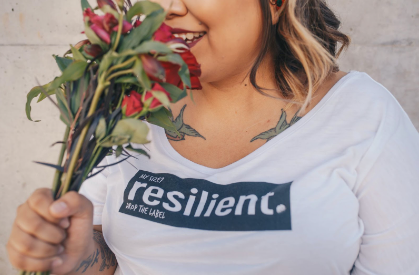Are you continuously judging and criticizing yourself while being kind, nice, and forgiving towards others? Are you constantly evaluating and measuring your worthiness based on your productivity or on how far you are in life?

Deep down you know you need to start to love yourself more. You know being your worst enemy is not good for you. But you are caught up in this vicious cycle of judgment and criticism of yourself and don’t know how to break free.
This may all feel too much to cope with. The anxiety keeps going up. The more anxious you feel, the more your mind criticizes, over analyzes, and reviews every detail. Anxiety amplifies when you revisit the past or live in the future. You either mentally review all the things that happened in the past or you look into the future and create what-if scenarios. All the stories about the future turn out catastrophic and negative.
It feels hard to turn down the volume of your inner critic who is watching your every move and always finding ways to make you feel small. When you make a mistake, fail in some way, or have shortcomings, your inner critic starts to judge and criticize you. Your “should” statements that dismiss, invalidate, or reject your current feelings and experiences. You beat yourselves up for any imperfection, instead of having any understanding or patience. You become your worst enemy. It is time to change that. Instead of your worst enemy, you can be your loudest cheerleader!
You have so much love to give to others and you are capable of treating yourself with the same kindness and care.
By turning the inner criticism into inner-soother, you will learn to regulate anxiety and self-soothe. You can start to feel good about yourself with all the ups and downs. Learning to love you comes with showing

yourself kindness and compassion.
Whenever we talk about self-compassion, there come misunderstandings and false ideas. Let’s debunk some of the myths around self-compassion:
Myth Number 1 – Self-compassion is self-pity: Self-compassion may seem like feeling sorry for yourself and that’s only because you may not have much experience with being nice to yourself. You may be quick to mix niceness and pity. There is a difference. Being nice and kind to yourself is showing yourself understanding, empathy, and forgiveness. It is recognizing that some upsetting event has occurred without comparing it to something else or dismissing how sad or hurt you feel.
Myth Number 2 – Self-compassion is ignoring the reality: Self-compassion is not being in denial of the negative and the unpleasant parts of your experience. It is not dismissing or holding on to only the positive. It is being able to see the whole picture the good and the bad without judgment and with care and love.
Myth Number 3 – Self-compassion won’t fix anything: If you grew up in an environment where emotions weren’t seen and recognized, you might come to think as an adult that when something bad happens, you must just fix it and get over it. You might come to believe that pausing and being loving and kind towards yourself about your pain is going to keep you more stuck and not going to fix anything. The fact is science has shown that self-compassion makes us more resilient and more likely to bounce back from adversity. It gives us strength, clarity, and optimism. Self-compassion is the loving, kind attitude we can show to ourselves. We become happier when we are more compassionate to ourselves, and happier people are more resilient.
“Feeling compassion for ourselves in no way releases us from responsibility for our actions. Rather, It releases us from the self-hatred that prevents us from responding to our life with clarity and balance” is a wonderful quote by Tara Brach.
Myth Number 4 – If I don’t have a self-compassion, I will never develop one: We are all born with the ability to show love, care, and kindness towards ourselves. There can be many experiences that have shaped your inner critical thoughts. While it is important to identify and understand the source of these negative thoughts about yourself, building a self-compassionate inner dialogue is a skill like anything else. It starts with practice and repetition. With dedication, you can turn your negative and critical thoughts to loving and compassionate thoughts.
You Can Start Talking To Yourself Like Someone You Love
Your new compassionate self-talk is the loving, kind thoughts that offer support, patience, encouragement, and understanding. It is there to be your loudest cheerleader and a good friend. Having a

compassionate self-talk does not mean you won’t take responsibility and stay accountable. It is about staying loving on a good and a bad day. You can think of having compassionate self-talk as an act of self-love. It changes the way you relate to yourself. It can become a way of taking care of you.
Compassionate and kind self-talk is proven to reduce anxiety and depression. We know that the way you think affects the way you feel. When you are self-critical and judgmental, your thoughts are feeding into your insecurity, low self-esteem, anxiety, and depression. When you turn your inner critic to an inner soother, you are having thoughts that are more flexible, forgiving, patient, and understanding, as a result you are feeling more empowered, calm, hopeful, and resilient.
When you start to talk to yourself as if you are talking to someone you love, your response to stress changes. Instead of resisting, fighting, or ignoring an unpleasant event that has occurred, your kind and loving self-talk helps you to be in the present moment. You start to meet yourself exactly where you are with what is going on. Instead of fighting what it should be or how you should be feeling, you pause and surrender into what it is that you are feeling and thinking. And the more you learn to respond to things rather than react to them, you start to have the calmness and clarity to make the next right decision for yourself. So one can argue that having a loving and compassionate self-talk makes you a better decision-maker.
Now that you know more about how being your loudest cheerleader, instead of your worst critic can help you, I want to share with you how to achieve it. When you learn any new skills, it can keep you on track to identify the steps you need to take and follow through to create your kinder, more compassionate inner dialogue.
In her book, Self-Compassion – The Proven Power of Being Kind to Yourself, Dr. Kristen Neff who is a pioneer in the field of self-compassion research has identified 3 elements of self-compassion: (1) mindful awareness, (2) recognizing the common humanity; and (3) self-kindness. Dr. Neff suggests keeping the self-compassionate dialogues non-judgmental, unconditional, and non-contingent.
During a difficult time, you can practice mindful awareness by simply observing and describe your experience without any judgment or opinion. The focus is to simply put words to your experience so that you can notice, recognize, and be aware. You can use phrases such as “I am noticing that I am feeling (blank),” “I am having the thought of (negative thought),” or “I am feeling (emotion).”
During the second part of your compassionate self-talk, you practice common humanity by recognizing how other people also experience the same painful and stressful experience you are having. Because when we are in pain and feeling anxious or insecure, we think we are the only one. We have false ideas that we must be the only one suffering or having a hard time. We forget that we are not alone and that many others go through what we are going through. Recognizing the common humanity is not about the comparison trap and to see who has it better or worse. It is about reminding yourself that you are not alone in feeling anxious. During stressful times, we forget that we are in this together.
In the last part of compassionate self-talk, you practice self-kindness by offering yourself comfort and affection. Self-kindness is about highlighting your strength and your perseverance in coping with difficult thoughts and feelings. Instead of saying “I shouldn’t feel this way,“ self-kindness is being able to say, “I give myself permission to feel my feelings” or “the way I feel is valid and normal, I accept my feelings.”
When you are having intense anxiety, you can practice compassionate self-talk by using the following script:
“I am feeling intense anxiety and I feel the tightness in my chest (mindful awareness), I know millions of people deal with anxiety and I am not alone in feeling this way (common humanity), I can give myself permission to take a break and tolerate the anxiety as I ride this wave (self-kindness).”
When dealing with insecurity and depression, the self-compassionate talk would sound like:
“I am having a hard time right now, the sadness feels heavy, this is a hard moment (Mindful awareness), this is part of life and I know I am not alone in my pain and suffering (common humanity), It’s OK to feel sad, I can do something nice for myself, I am worthy of giving myself love and affection, may I be kind, may I be healthy, may I be safe (self-kindness).”
With everything that is going on with COVID-19, you can also alter your compassionate self-talk to offer yourself comfort and care by trying the following dialogue:
“I am frustrated with all the unknowns and feel out of control (mindful awareness), I have to remember that I am not alone and the whole world is fighting the same

battle (the common humanity), I am doing my best to keep myself and my loved ones safe, I am going to give myself permission to do something that helps me feel grounded and connected (self-kindness).”
When our lives have changed abruptly and we find ourselves working from home while also parenting and homeschooling our kids, the compassionate self-talk can be used: “I feel overwhelmed to work from home and also homeschool my kids (mindful awareness), I know this is a new experience for many parents. I know I am not alone in feelings overwhelmed and stuck. Our community will get through this together. We are in this together. I am not alone (common humanity). I am going to try to be flexible and let go of perfectionism. I will be gentle with myself as we navigate this new time. I will allow myself grace, and remember our resilience (self-kindness).”
If you are having a hard time creating your script, try to imaging that someone you love is having the anxious thoughts and the overwhelming emotions that you are experiencing. You can think of someone you love near your age or someone younger. Think about how you would respond to them. Most often we are nicer, kinder, and more accepting of those around us than we are of ourselves. It comes easier for us to show compassion to others than to ourselves. This exercise can help you to put the words together for your new self-compassionate language. Once you have clarity of how you respond to others, it is important to say it to yourself.
Embracing You Therapy Group Practice
Here at Embracing You Therapy, we invite you to explore with us how life would be different if you had more control over your thoughts and emotions, and we invite you to consider that it is possible to accept things just as they are, embracing imperfections to create a gentler place for calm in your life.
Let’s learn what drives your unique perspective on anxiety and stress. Then, let’s find the tools-your unique tools-that help you respond to life in a healthy, calm way. Contact us today for your complimentary 15-minute phone consultation with one of our Client Care Coordinators.





